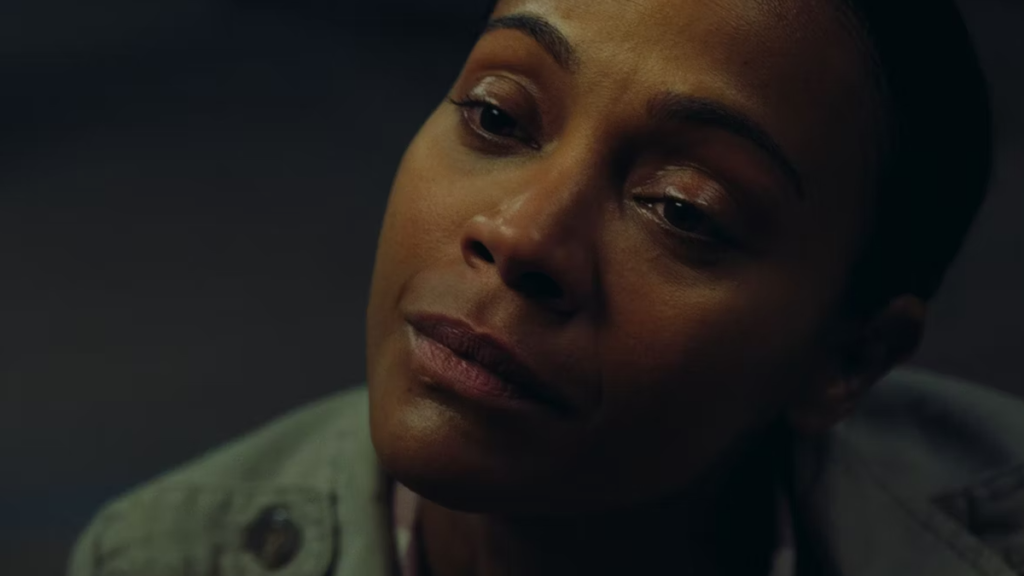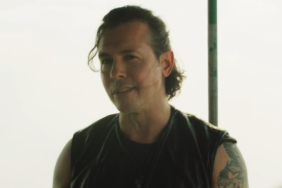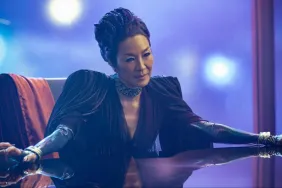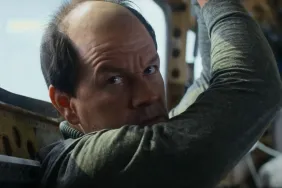ComingSoon Editor-in-Chief Tyler Treese spoke with The Absence of Eden writer and director Marco Perego and star Zoë Saldaña about the intense drama movie. The duo discussed the process of working with your spouse and the themes of the film. The Absence of Eden is set to release in theaters on Friday, April 12.
“The Absence of Eden takes place at the border between the United States and Mexico – a hellish landscape inhabited by coyotes, armed officers, desperate immigrants, and refugees,” reads the film‘s synopsis. “When Esmee (Saldaña), a young woman working as a private dancer in Mexico, is forced to commit a violent act of self-defense that results in the death of a cartel member, she flees her homeland for sanctuary in the United States. Guided by a ruthless Coyote and a group of undocumented immigrants, she befriends a young mother and her daughter along the way. Before crossing the border, the mother is taken from the group, and Esmee promises to protect her daughter and help them reunite again in America, touching off an interlocking story about people struggling to survive on America’s border with Mexico.”
Tyler Treese: Zoë, you were fantastic in this, and you can really see the emotion that you pour into your performance here. How was it grappling with such heavy subject matter throughout the entire shoot? We’re talking immigration, we’re seeing the terrible things that these people who are desperate for a better life are put through.
Zoë Saldaña: Well, I mean, the manhandling was hard. It happened. It happens. These dark aspects of immigration happen day by day, and whether we choose to talk about it or not, it doesn’t make it go away. It doesn’t mean it’s not going to happen. There is sex trafficking of women. There is sex trafficking of children that goes on at whatever border across the world. And that, to me, was uncomfortable. It was disheartening. It was painful.
And that’s why I felt compelled to be a part of this — to force myself to take a deep dive and put myself in someone like Esmee’s shoes and walk her path, you know? AI did it for the purpose of, one, to support my husband and his art — because I have a great level of respect for Marco as an artist. And two, to just add this sense of humanity to a conversation surrounding people that is, more often than not, forgotten.
Marco, I was so impressed that this was your feature debut. I really like that you showed the humans involved in both sides of the border, as there aren’t really caricatures. These are humans where you see their struggle on both sides. How was it going deeper into the issue and exploring these very flawed people and this terrible situation that is impacting so many?
Marco Perego: I think you make such a great point. When you use the word flawed, I think we are a little bit … the complexity of a human being is not just one color and another. There is a gray color in the middle, and I think the idea when I was writing with my partner was about the human feeling, the human behavior, and the complexity when you make a choice because you are obligated to make a choice after really thinking if you’ve made the right choice. For me, it was, “Can I really show both sides and not just one side and put a love story?”
The most important thing was to really have a conversation about human beings. It really was about that. You really nailed it. You really understand what I was trying to say. It was about the human aspect of that, not just one side.
It really like makes the heart swell to see a husband and wife making art together like this. Zoë, what was most unique about being directed by your husband? That’s a very unique situation.
Saldaña: Just how in command he was, like how happy he was to be there. This is his element. I feel like Marco’s at his happiest and at his sharpest when he’s on set or he’s sculpting or he’s painting or conceiving a concept of art. It’s just marvelous to see how just great he is at doing it and how happy he feels when he is doing it. It’s not just the love that I feel for him as a person, it’s also the level of respect that I have for him as an artist. So I was very compelled.
Marco, I wanted to ask about the ending because it’s very realistic. It’s not a glamorized Hollywood ending. Talk to me about that sudden ending, because I thought it was very effective.
Perego: The question is, “What kind of man are you becoming?” And the film finishes with a question. I don’t know. I don’t want to tell you what the film is about. I want you [to] discover the day after, the film stays with you. I really want to finish this way. I really think it was very important to give the audience the possibility to come in and really let it sit in yourself and really understand what you stand for. And that’s okay, no matter what. That’s the complexity.










